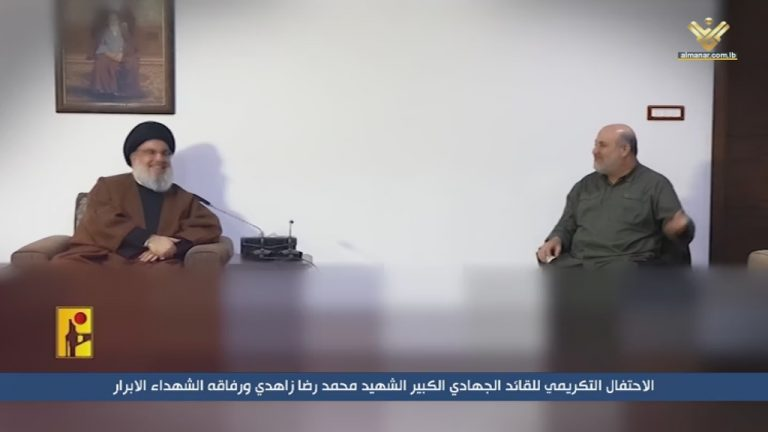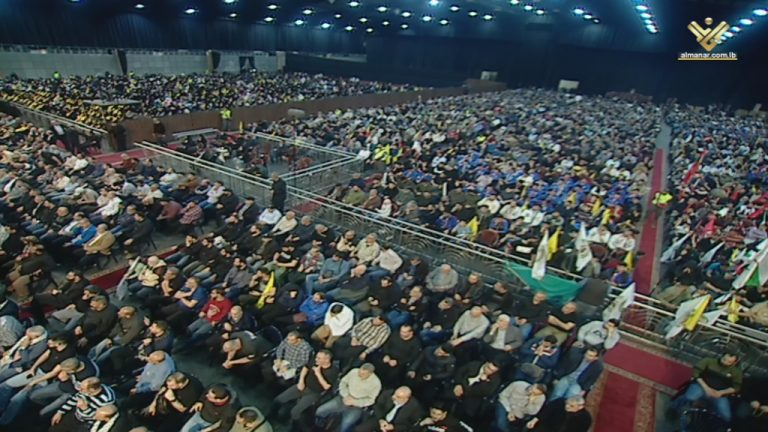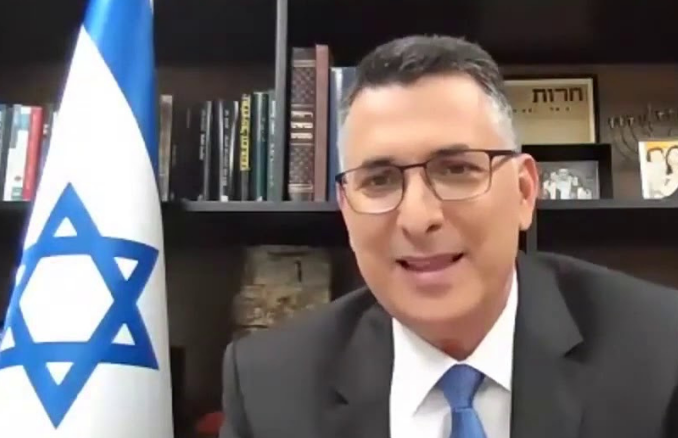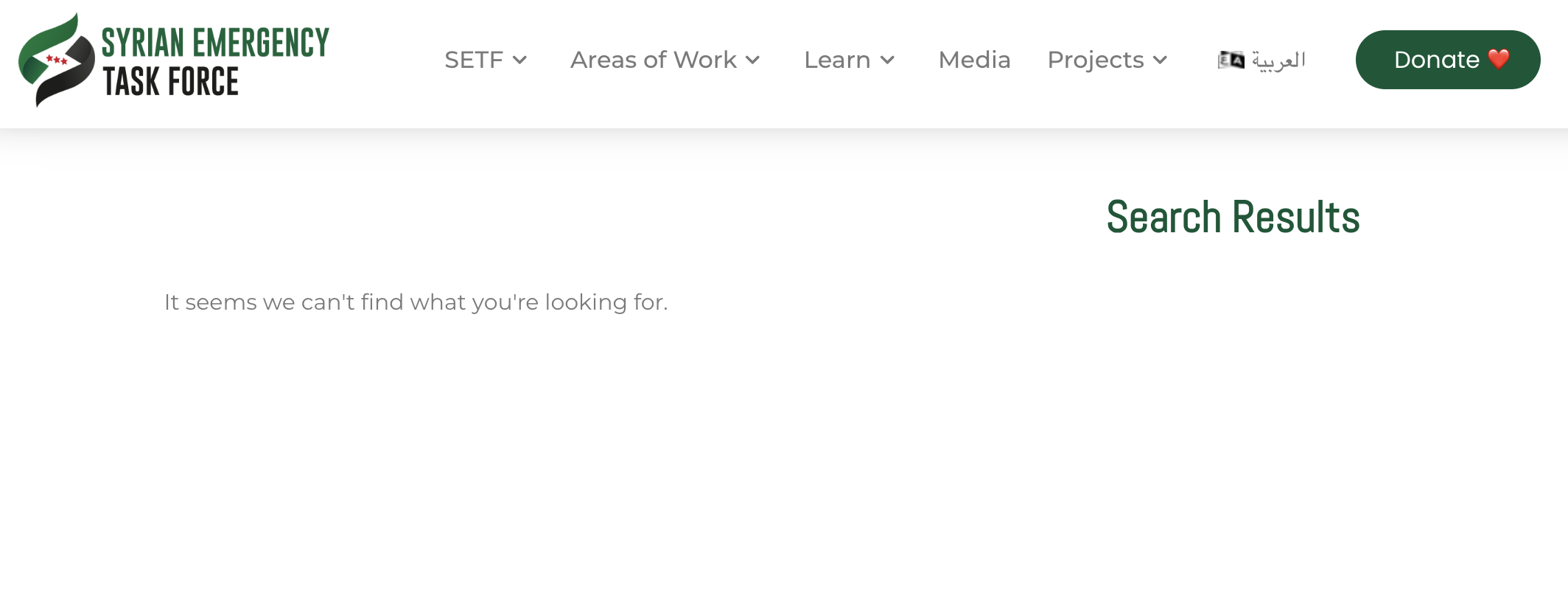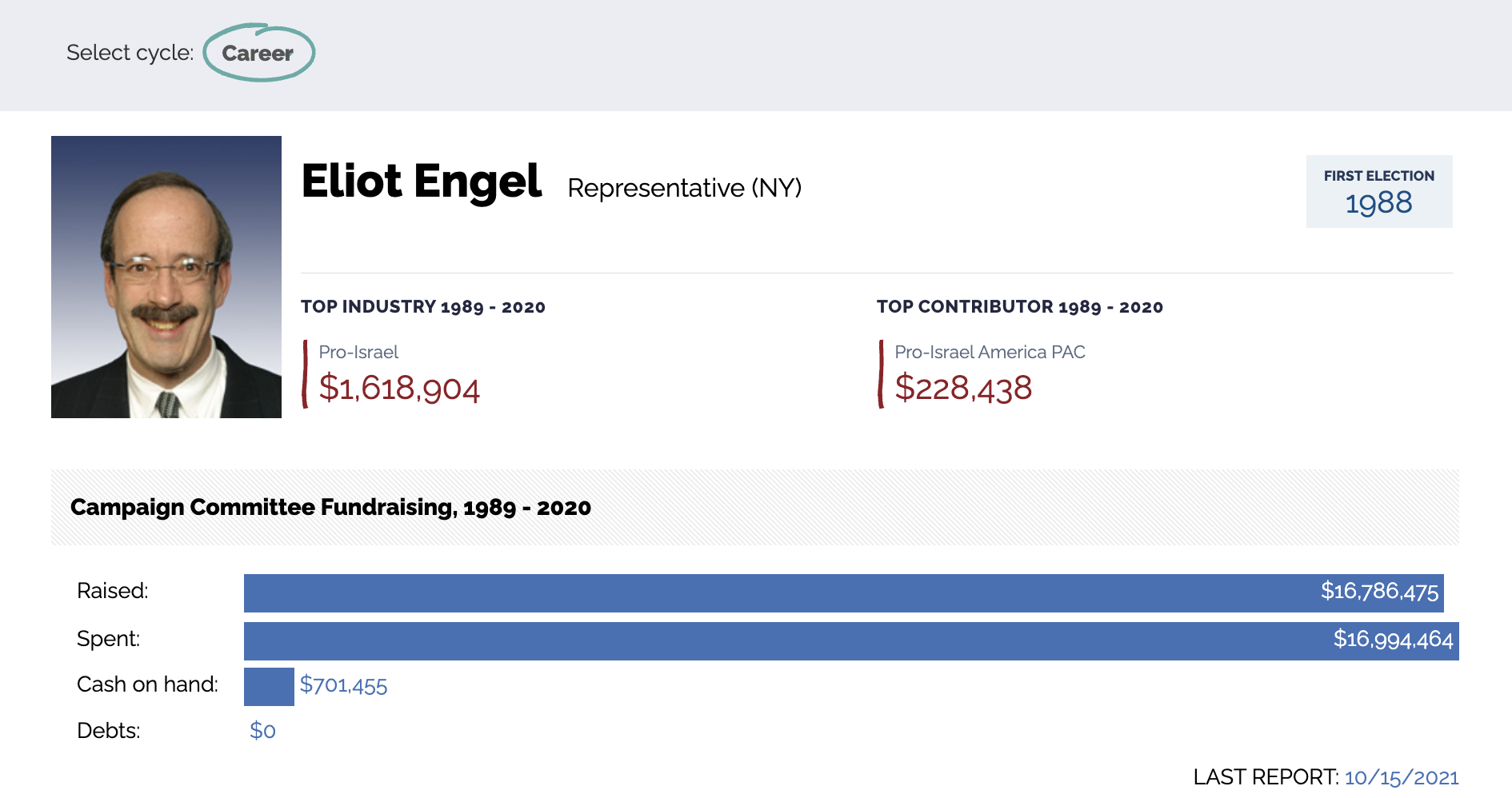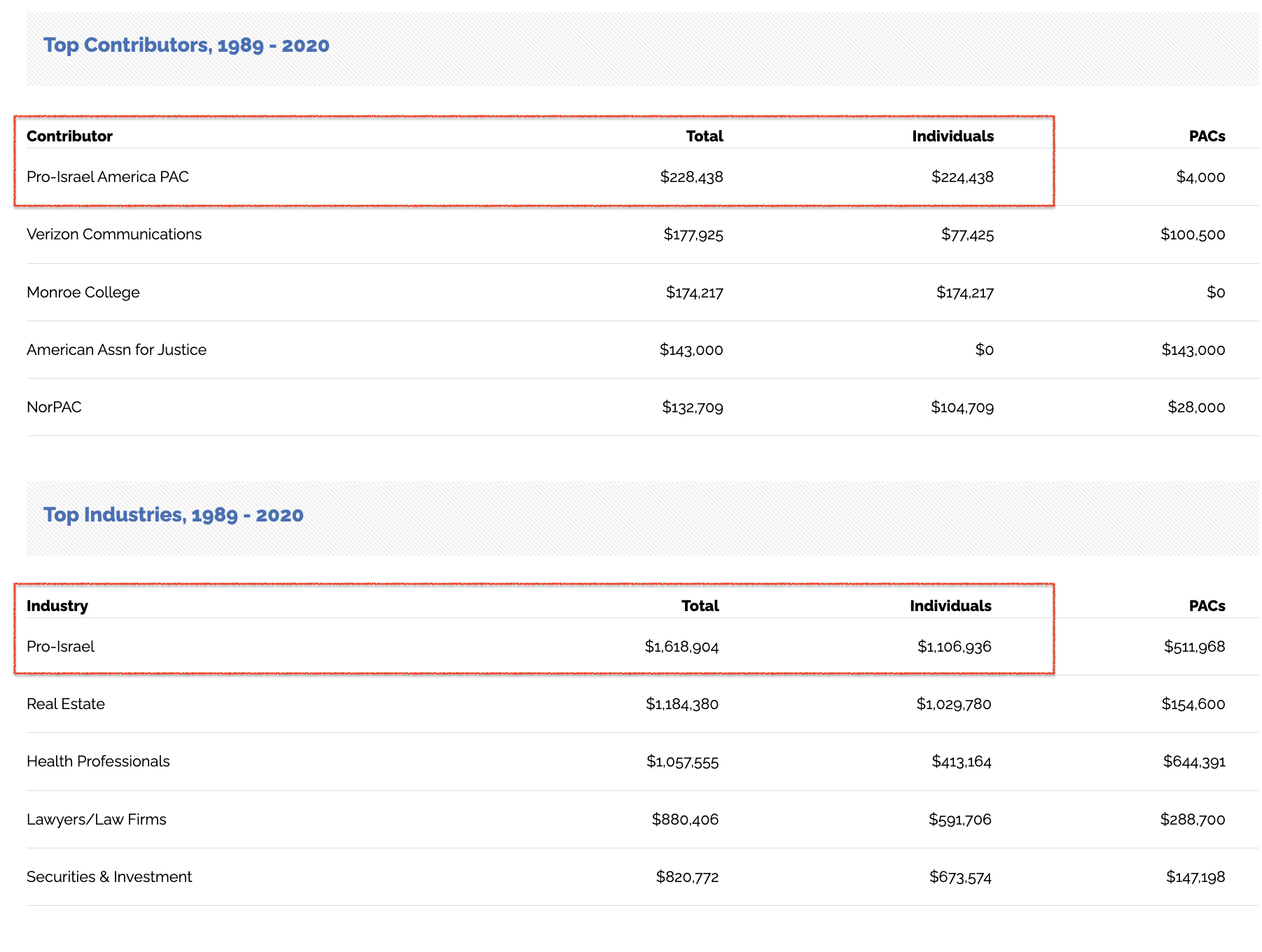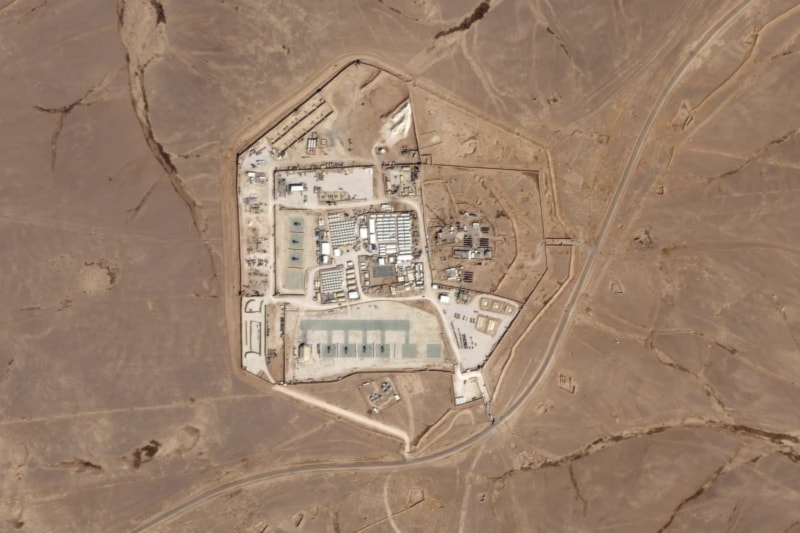
On April 13, Iran, alongside Lebanon’s Hezbollah and Yemen’s Ansar Allah, executed Operation True Promise, a vast wave of drone, cruise and ballistic missile strikes on Israel, launched in retaliation to Tel Aviv’s criminal bombing of Tehran’s Damascus embassy less than two weeks earlier, which killed two Iranian generals. As a result, history was made, and the world – particularly West Asia – will never be the same again.
“This action was hugely significant. Now, the Israelis will have to be extremely careful about what they do in Syria against Tehran. The regional balance of power has permanently shifted away from the Zionists. Tel Aviv will never recover at all. It is the end of them. They have destroyed themselves. They are seen as a regime that has no place in the civilized world, a Nazi state, across the entire globe,” geopolitical expert Dr. Mohammad Marandi tells MintPress News.
Iran’s first-ever strike on Israel, following decades of provocations, escalations, assassinations, incendiary threats, and determined lobbying for U.S.-led war against Tehran by Tel Aviv officials, the effort targeted airbases, Israeli Air Force intelligence HQ and a constellation of air defense systems. The U.S., Britain, and France scrambled jets to help shoot the vast payload down – unsuccessfully – while Jordan controversially permitted Western powers to use its airspace for the purpose. Israel claimed a 99% interception rate.
However, extensive photo and video material shows that most missiles hit their targets and wrought much damage. In the process, Iran demonstrated to Tel Aviv and its Western backers a hitherto unknown ability to circumvent layer upon layer of protective measures, including top-tier fighter jets, NATO-supplied air defense systems, and the much-vaunted Iron Dome. One by one, they largely failed in their duty, leading to the astonishing sight of Iranian missiles soaring unmolested over the Knesset.
This righteous scene no doubt sent untold chills through Western and Israeli corridors of power, searching vainly for spines to run up. It also dispatched a palpable message—Tehran could, if it wished, have struck the Zionist legislature but didn’t do so. For the time being, at least. The floor was now Tel Aviv’s to decide whether—and how—to retaliate. A response came on April 19 in the form of pre-dawn drone sorties across Iran.
Initially framed by Western media as hugely impactful, in reality, a small swarm of Israeli quadcopters attempted to breach Tehran’s air defenses but ultimately couldn’t. An Iranian spokesperson referred to the effort as “failed and humiliating.” This characterization surely applies more widely to the pathetic state to which Tel Aviv has been reduced following Operation True Promise’s seismic success. As we shall see, Israel now has little time remaining and no good choices left to make.
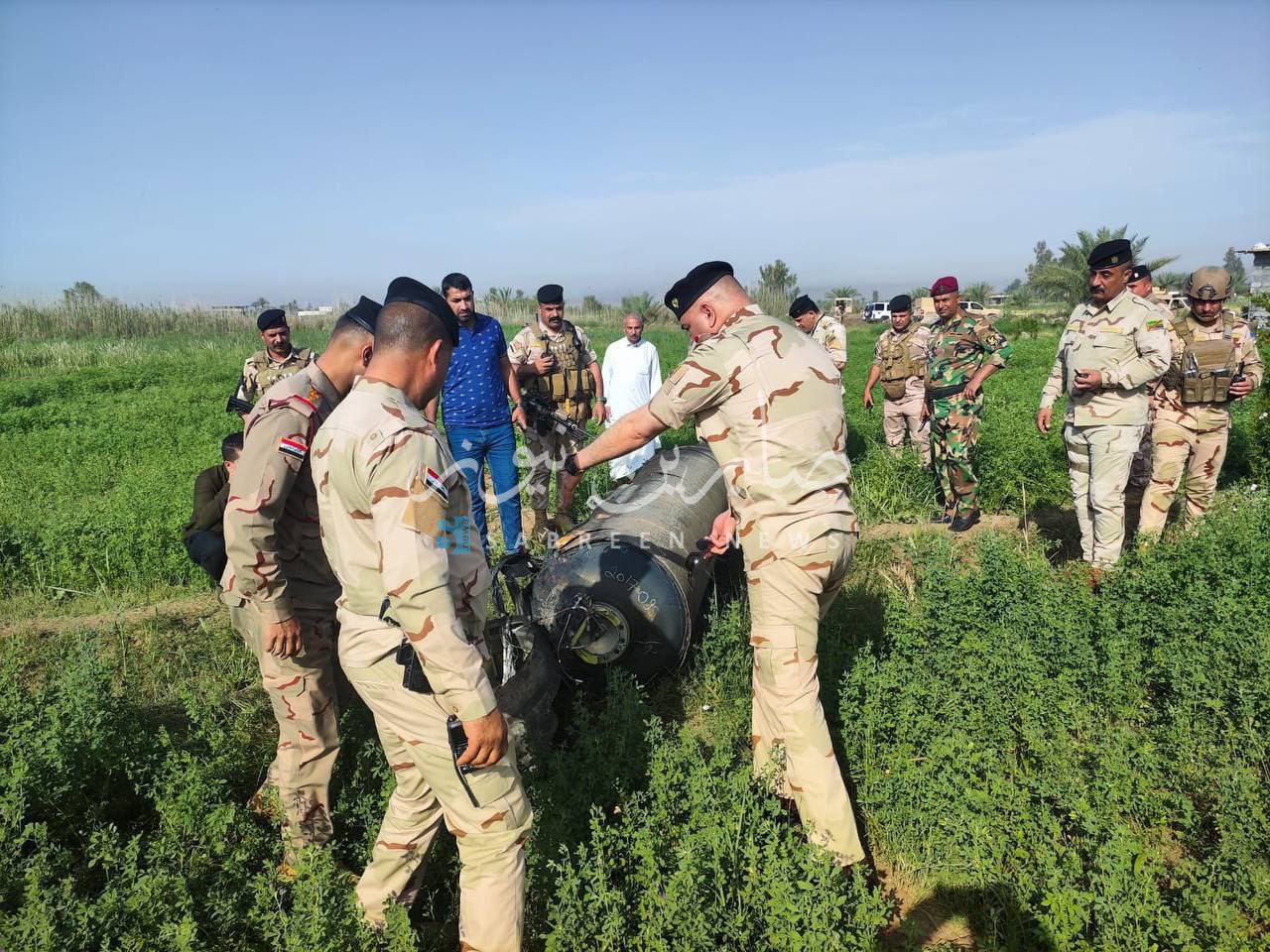
‘NEW EQUATION’
Despite its astonishing optics and unprecedented nature, some West Asian observers were disappointed that the attack on Israel wasn’t a decapitation. Such perspectives overlook Iran’s longstanding commitment to caution. Devastation of Tehran’s Syrian embassy was without historical parallel and concerned with Israel eliciting a major escalation to drag the U.S. into total war. A measured, well-advertised show of strength deterred a broader response while signaling a major shift in Iranian policy towards Israel. IRGC commander Hossein Salami has said:
“We have decided to create a New Equation, and that is if from now on the Zionist regime attacks our interests, assets, personalities, and citizens, at any point, we will attack against them.“
Those are fighting words, and Operation True Promise demonstrated they can be backed with action. Iran has shown it can strike Israel directly from its own soil, its fleets of missiles and drones capable of traveling thousands of kilometers over both friendly and hostile airspace, separate timezones, and multiple countries. Along the way, Tehran will have gleaned an enormous amount of invaluable intelligence on the defensive capabilities and vulnerabilities of Israel and the local Western infrastructure upon which its defenses depend.
Any future Iranian strike would make the most of whatever was learned on April 13, and the data yield was surely enormous. Since Russia’s “Special Military Operation” began in February 2022, defense cooperation between Moscow and Tehran has reached extraordinary levels – and intensive learning and on-the-go refinement of battle strategy is core Russian military doctrine. As a nameless Ukrainian Army officer bitterly told Politico on April 3, Western weapons systems sent to Kiev “become redundant very quickly because they’re quickly countered by the Russians”:
“We used Storm Shadow and SCALP cruise missiles [supplied by Britain and France] successfully – but just for a short time. The Russians are always studying. They don’t give us a second chance. And they’re successful in this.“
If there’s a next time, too, Iran’s missile and drone fleet is likely to be considerably more sustained, playing out over several days, weeks, or even months, wave after wave, burst after burst. Estimates suggest around 300 separate projectiles were fired at Israel during Operation True Promise. Largely unsuccessful attempts to repel the blitz by Tel Aviv alone cost $1.08 – 1.35 billion, according to an Israeli Defense Forces (IDF) general.
“One Arrow missile used to intercept an Iranian ballistic missile costs $3.5 million, while the cost of one David Sling missile is $1 million, in addition to the sorties of aircraft that participated in intercepting the Iranian drones,” they told local media. Meanwhile, an Israeli think tank researcher calculates the costs “were enormous,” comparable to what Israel burned through during the entire 1973 Arab-Israeli war, which lasted almost three weeks.
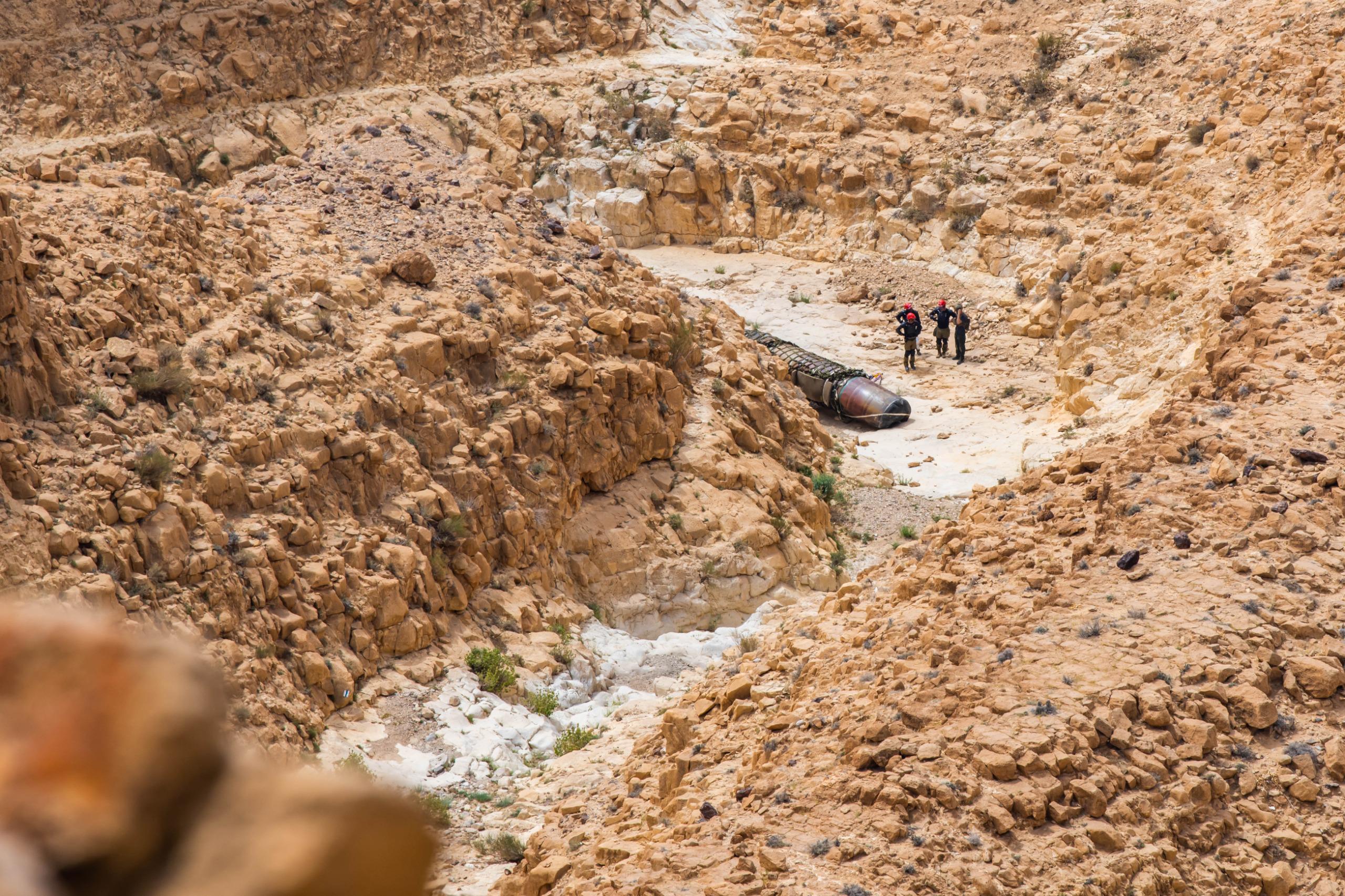
Those sums were spent on missile interceptors, missiles, jet fuel, and other military equipment and infrastructure. It is uncertain how much Iran spent on the Operation, but it is undoubtedly a great many orders of magnitude less. Some sources have suggested $30 million, which could well be accurate. Dr. Marandi tells MintPress News that “most” of the initial “decoy” barrage, including drones, were collecting dust. “Tehran was looking for an excuse to get rid of them,” he says.
“Most of the heavy-duty work attempting to counter Iran’s strike was done by the Americans anyway, not the Israelis. The Iron Dome barely factored in. The two places hit hardest – the southern airbase where F35s are based and Tel Aviv’s Golan Heights intelligence base resulted in significant damage and casualties. Of course, the Zionists don’t admit this,” Dr. Marandi adds.
This massive cost discrepancy is a very, very grave issue for Israel, as the U.S. can attest, given its embarrassing experiences attempting – and completely failing – to end Ansar Allah’s anti-genocide blockade of the Red Sea. Almost immediately, Politico reported that the Pentagon was aghast at squandering missiles costing millions to shoot down $2,000 Ansar Allah drones. A CIA officer lamented:
“That quickly becomes a problem because the most benefit, even if we do shoot down their incoming missiles and drones, is in their favor. We, the U.S., need to start looking at systems that can defeat these that are more in line with the costs they are expending to attack us.“
‘ISRAEL GOES UNDER’
There is no sign yet of Washington having publicly rectified this concern, which may account for why U.S. officials at the start of April offered Ansar Allah a sweeping offer of total surrender in return for ending the Red Sea blockade. This was summarily rejected. No business as usual – no commerce, no trade – on Yemen’s watch while Palestinians are slaughtered. In the event of any subsequent Iranian strike on Tel Aviv, too, Tehran’s drones will not be used to deter shipping either, but tie up, smoke out, and exhaust Israeli air defenses.
This tactic was used to significant effect on April 13, as it has been by Russia since its airstrikes on critical Ukrainian infrastructure began in late 2022. Now, Kiev is on the verge of being de-electrified, which will cause battlefield collapse and population displacement, with potentially devastating knock-on effects on neighboring countries and states trying to keep Kiev’s lights on. It seems safe to say neither Israel nor its Western allies could sustain a serious defense to a protracted assault by Tehran, economically or materially.
That conclusion is supported by an April 22 Wall Street Journal report, which revealed the Biden administration was shocked at the scale of Iran’s barrage. It “matched worst-case scenarios” outlined by U.S. intelligence and the Pentagon, an unnamed senior official despairing, “this was on the high end…of what we were anticipating.” White House Situation Room attendees on the day allegedly feared Israel and its allies would not be able to repel the assault. And they couldn’t.
On top of a mass crime against humanity amounting to a 21st-century Holocaust, Israel’s genocide in Gaza has been utterly destructive to its own economy. A Financial Times investigation published on November 6 documented how the assault has ravaged personal finances, job markets, businesses, industries, and the Israeli government itself.
“Thousands” of companies were teetering on the brink of collapse, with entire sectors plunged into an unprecedented crisis. One in three businesses had either shuttered or were operating at 20 percent capacity.“
One can imagine how much worse things have gotten in the six months since, and Israel isn’t yet embroiled in an all-out war. An extended period of mass strikes from Iran, Ansar Allah and Hezbollah could completely paralyze the country economically, render entire areas uninhabitable – or, at least, uninhabited – destroy infrastructure, and much more. Among the infrastructure in Tehran’s crosshairs could well be the Dimona nuclear power plant, which would unleash deadly chaos on a terrifying scale.
Resultantly, Israel’s “Samson Option,” under which it is committed to launch a mass nuclear strike if its existence is threatened, should no longer be taken very seriously. Israeli military theorist Martin van Creveld once boasted, “We have the capability to take the world down with us, and I can assure you that will happen before Israel goes under.” But Tehran’s hypersonic missile capabilities are in every way an effective counter-deterrent. They could even deliver a nuclear, chemical or biological payload of their own.
‘WHOEVER MOVES’
Israel’s Iranian drubbing is further exacerbated by its attempt to crush Hamas being an absolute disaster in every conceivable way. The fiasco’s consequences are and will remain wide-ranging and grave, to the extent they could be fatal. This may account for Netanyahu’s flailing bid to draw Tehran into all-out war. After all, the scale of the Israeli Defense Forces’ defeat is such that in a scathing op-ed for Haaretz on April 11, Zionist “journalist” Chaim Levinson lamented:
“We’ve lost. Truth must be told… It’s unpleasant to say, but we may not be able to safety [sic] return to Israel’s northern border…No cabinet minister will restore our sense of personal security. Every Iranian threat will make us tremble. Our international standing was dealt a beating. Our leadership’s weakness was revealed to the outside. For years we managed to fool them into thinking we were a strong country, a wise people and a powerful army. In truth, we’re a shtetl with an airforce, and that’s on the condition it’s awakened in time.”
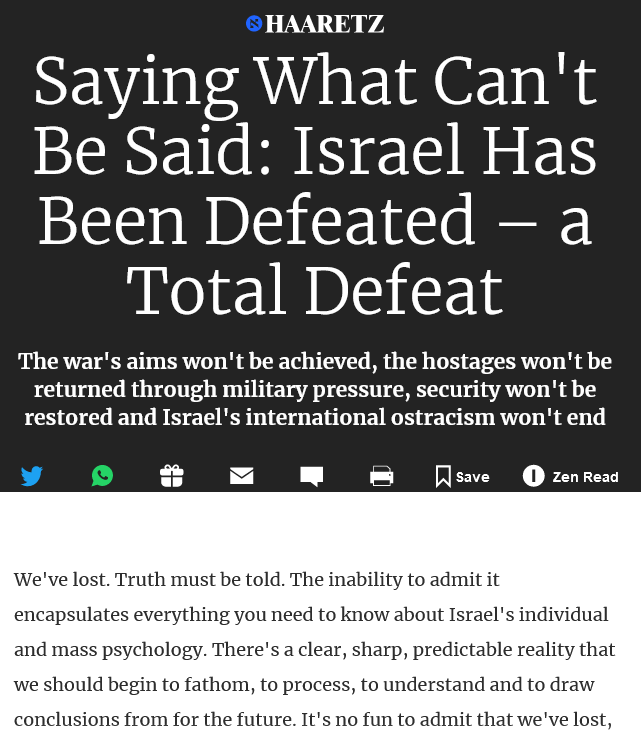
Even the Western media, which since the genocide began has been at best silent and at worst complicit – and much more active in the latter sphere than the former – has acknowledged Tel Aviv’s battlefield cataclysm. The Economist, a nakedly Zionist publication that has whitewashed, diminished, or outright justified every conceivable crime committed by the IDF, has condemned the Forces’ “military and moral failures” and how “its generals botched the strategy, and discipline among troops has broken down”:
“[Israel is] accused of two catastrophic failures. First, it has not achieved its military objectives in Gaza. Second, it has acted immorally and broken the laws of war. The implications for both the IDF and Israel are profound…Hamas fighters are still ambushing Israeli forces throughout Gaza, and the group is reasserting itself in areas the IDF has left…Accusations that Israel has broken the laws of war are plausible.“
The Economist went on to slam a “lack of enforcement” of already virtually non-existent “rules of engagement” under which the IDF operates. A “veteran reserve officer” was quoted as saying commanders could arbitrarily “decide that whoever moves in his sector is a terrorist or that buildings should be destroyed.” A sapper in another unit admitted, “The only limit to the number of buildings we blew up was the time we had inside Gaza”:
“Soldiers have filmed themselves vandalizing Palestinian property and, in some cases, put those videos online. On February 20, the IDF’s chief of staff published a public letter to all soldiers warning them to use force only where necessary, ‘to distinguish between a terrorist and who is not, not to take anything which isn’t ours – a souvenir or weaponry – and not to film vengeance videos.’ Four months into the war, this was too little, too late.”
That The Economist printed such things at all reflects how far Israel has fallen since October 7, 2023. Now, it is a global pariah, viscerally loathed by the overwhelming majority of the world’s citizenry. Adversaries do not fear its once-vaunted military and its ability to unilaterally strike neighboring countries with total impunity, and no comebacks, is over. Tel Aviv’s claim to “defense” and security primacy, upon which much of its exports were successfully marketed for decades, has been amply demonstrated to be bogus.
Meanwhile, Israel has suffered population collapse, with simultaneous mass brain drain and workforce freefall as settlers flee or get conscripted. Demand for mental health services has reached all-time highs. The trauma of perpetrating genocide and living under the daily threat of attack, as Palestinians have since 1948, has ravaged soldiers and civilians alike. But scores of psychiatrists have relocated elsewhere due to stressful workloads and likely won’t return. Such are the foundational flaws of a settler colonial state.
“I don’t think 10 years from now Israel will exist. Zionism will die. The only solution is equal rights for Christians, Muslims, and Jews throughout Palestine. This war will continue, but direct engagement with Iran would be totally destructive, militarily. So the Israelis now target Rafah, but they will be defeated there, and they know that. As long as Netanyahu is leader, we will have a continuation of this tragedy. The only way out is a coup in Tel Aviv,” Dr. Marandi concludes.
For many, these developments may be little consolation, coming as they do off the back of thousands of murdered and mutilated Palestinian children. Yet, Israel as we know it is on the brink of extinction, which wasn’t the case before Hamas breached Gaza’s concentration camp walls. Palestine is now closer to being free than at any point since Israel’s creation. And there is no going back to “normal.”
Time is now and forever on the side of the tenacious, undefeated Resistance – so, too, justice and virtue. We should never forget the immortal, galvanizing words of Palestinian poet Refaat Alareer, slain in cold blood by a targeted IDF airstrike on December 6, 2023:
“If I must die, let it bring hope‘
Feature photo | A passerby, taking on his cellphone, walks past a banner showing missiles being launched from Iranian map in northern Tehran, Iran, April 19, 2024. Vahid Salemi | AP
Filed under: "Israel", France, Israel-UK Relations, Nazi Israel, Syria, The Islamic Republic of Iran, USA | Tagged: Iran Retaliation Attack, IRGC commander Hossein Salami, Iron Dome, Israeli Attack on Embassy in Damascus, Knesset, Operation True Promise, The Islamic Revolution Guard [IRGC], West Asia | Leave a comment »












